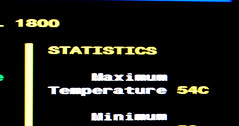I’ve been meaning to have a stab at creating something similar to a friend wheel, but using library data, for a while now. Here’s a prototype which uses our “people who borrowed this, also borrowed…” data to try find strong borrowing relationships…

I picked three random Dewey numbers and hacked together a quick PerlMagick script to draw the wheel:
- 169 – Logic -> Analogy (orange)
- 822 – English & Old English literatures -> Drama (purple)
- 941 – General history of Europe -> British Isles (light blue)
The thickness and brightness of the line indicates the strength of the relationship between the two classifications. For example, for people who borrowed items from 941, we also see heavy borrowing in the 260’s (Christian social theology), 270’s (Christian church history), and the 320’s (Political science).
The next step will be to churn through all of the thousand Dewey numbers and draw a relationship wheel for our entire book stock. I’ve left my work PC on to crunch through the raw data overnight, so hopefully I’ll be able to post the image tomorrow.








